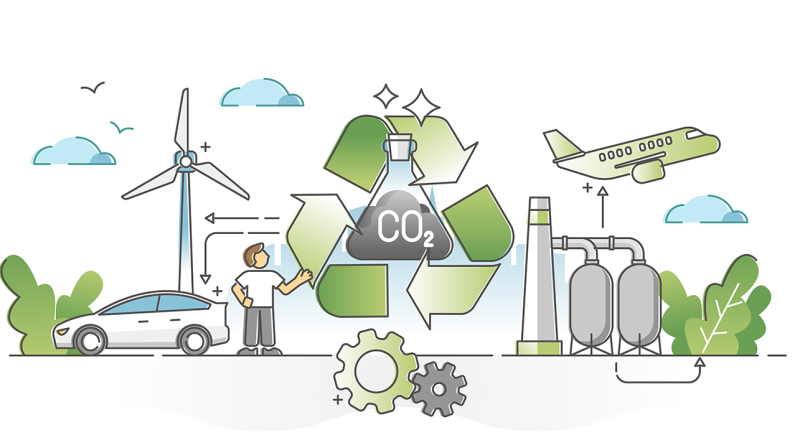Vast and Mabanaft Move Forward with Green Methanol Sustainable Transport Project
Vast Renewables and Mabanaft are spearheading an ambitious project in South Australia that promises to transform green fuel production. The SM1 green methanol plant, located at the Port Augusta Green Energy Hub, is designed to produce 7,500 tonnes of green methanol annually. This project represents a critical step forward in decarbonizing hard-to-abate sectors like shipping and aviation, both of which are significant contributors to global carbon emissions.
What sets the SM1 project apart is its reliance on concentrated solar thermal power (CSP) technology. CSP not only provides the electricity needed for the plant’s operations but also generates industrial process heat, making it an ideal solution for sustainable fuel production. This integration of clean energy into fuel production positions SM1 as a groundbreaking venture that could serve as a blueprint for future renewable energy projects.
Fichtner and BSE methanol lead innovation
The success of SM1 hinges on strategic partnerships with two engineering powerhouses: Fichtner and bse Methanol. These companies have been awarded pre-FEED (front-end engineering and design) contracts, marking a significant milestone in the project’s development. Their combined expertise is vital to integrating cutting-edge technologies that will make SM1 a global leader in green methanol production.
Fichtner, an international engineering group, brings a wealth of experience in renewable energy projects, particularly in energy storage and hydrogen technologies. Their role in SM1 involves the integration of proven technologies that can significantly reduce production costs, as highlighted in a recent report stating CSP could lower costs by as much as 40%.
Meanwhile, bse Methanol, a leader in e-fuels, will implement its FlexMethanol® modules. These innovative modules are designed to convert carbon dioxide from flue gases into methanol, allowing for modular and decentralized production. The collaboration with Australian technology firm Calix will enable the capture of process carbon dioxide from industries like cement and lime production.
Decarbonizing shipping and aviation with green methanol
One of the most compelling aspects of the SM1 green methanol project is its potential to revolutionize fuel sources in the shipping and aviation sectors, two industries that have been notoriously difficult to decarbonize. Methanol, as one of the most versatile hydrogen derivatives, offers a low-carbon alternative that can be used as fuel for both ships and aircraft. Unlike fossil fuels, methanol can be produced using renewable energy sources, making it a powerful tool in reducing greenhouse gas emissions.
Shipping and aviation collectively account for a significant portion of global emissions, and traditional methods of fuel production are not equipped to meet the climate goals set out by international organizations. However, SM1’s reliance on concentrated solar thermal power (CSP) and advanced technologies like electrolysis for hydrogen production make it an ideal solution for these industries. The project aims to deliver green methanol that is not only sustainable but scalable, potentially serving as a template for similar projects worldwide.
The projected annual output of 7,500 tonnes of green methanol positions SM1 as a key player in the growing market for renewable fuels. With the backing of international partners and innovative technology providers, SM1 has the potential to make a tangible impact on the future of clean transportation.
Funding and support
The SM1 project has garnered significant financial backing from both the Australian and German governments, reflecting its importance on a global scale. In June 2024, Vast and Mabanaft signed a joint development agreement, solidifying their collaboration on the SM1 project. Shortly after, the project secured AUD $19.48 million from the Australian Renewable Energy Agency (ARENA), in addition to EUR 12.4 million from Projektträger Jülich (PtJ), a German government initiative aimed at advancing hydrogen and green fuel technologies.
This financial support underscores the critical role SM1 is expected to play in the international push for green fuels. The project is also part of the larger HyGATE initiative, a collaboration between the Australian and German governments to develop a hydrogen supply chain that can serve both domestic and global markets. With increasing global demand for cleaner fuels, SM1 is well-positioned to lead Australia’s green fuel industry while contributing to global decarbonization efforts.
The joint funding ensures that SM1 will have the necessary resources to complete its pre-FEED phase and move toward full-scale production. This collaborative approach between nations highlights the importance of international cooperation in tackling the climate crisis and transitioning to sustainable energy sources.
Pioneering technologies and the future of Australia’s green energy
The SM1 green methanol plant is not only a breakthrough for renewable fuels in Australia but also a testament to the pioneering technologies that drive the green energy sector forward. Central to SM1’s success is its integration of innovative systems like the Leilac calcination plant, which captures carbon dioxide produced during cement and lime manufacturing. This process, enabled by Australian company Calix, allows the captured CO2 to be used in methanol production, contributing to a circular economy approach.
Further enhancing SM1’s technological edge is the FlexMethanol® system developed by bse Methanol. This modular technology efficiently converts carbon dioxide and energy into methanol, allowing for a decentralized and scalable production model. Coupled with the 30 MW concentrated solar thermal power (CSP) plant at Port Augusta, SM1 demonstrates how renewable heat and electricity can be harnessed for industrial applications.
As Australia’s first solar-powered methanol plant, SM1 sets the stage for future projects aiming to decarbonize industries reliant on high-emission fuels. With strong support from international partners and governments, SM1 could catalyze the development of a global green fuels pipeline, solidifying Australia’s position as a leader in renewable energy and clean fuels.
Sources:
